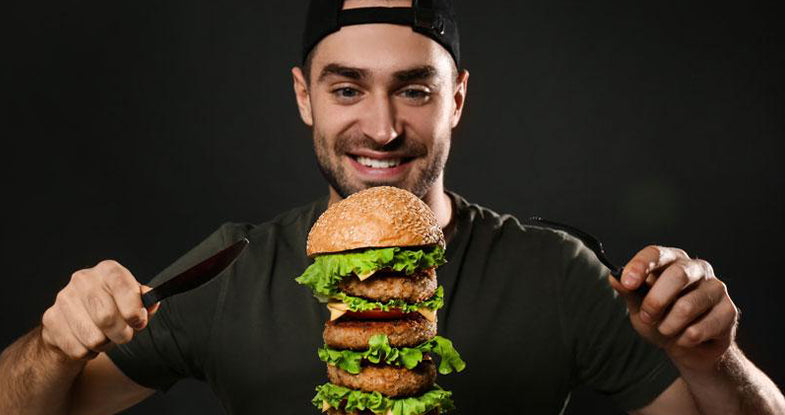A refeed day refers to the practice of consuming additional calories, and usually extra carbs, one or more days per week.
Most often, people use refeed days as part of their fat loss strategy.
And the primary purpose of a refeed day is to accelerate the fat loss process. But research suggests there may be other benefits, too.
In this article, you’ll learn what research says about refeed days, 6 potential benefits, and how to incorporate them with practical examples.
What is a Refeed Day?
Refeed days are different from “cheat days” because “cheating” on your diet implies you’re breaking a rule.
In contrast, refeed days are pre-planned and follow set guidelines as part of your overall dietary approach.
Also, people typically eat junk food on cheat days, which isn’t necessarily the case during refeed days. Overall, cheat days are probably a bad idea, and can lead to an unhealthy mindset around eating.

How do refeed days work? The popular explanation is that they raise leptin, a fat-burning hormone, which can increase weight loss.
However, according to research, the correct answer may be more complicated. Keep reading to learn what science really says about refeed days.
6 Possible Benefits of Incorporating Refeed Days
- Better exercise performance and recovery[*][*][*]
- Could help preserve muscle mass during weight loss[*]
- May raise testosterone and other hormones[*]
- Refeed days might make dieting easier psychologically[*]
- Leptin may play a small but beneficial role in increasing fat-burning[*]
- Refeeding could boost fat-burning or preserve metabolism through other means besides leptin[*][*]
The Science Behind Refeed Days (And Do They Work?)
Currently, there’s no direct research into “refeed days” conclusively proving they work.
However, there’s plenty of indirect scientific evidence that supports refeed days.
At the same time, though, they may work differently from how people generally assume.
Leptin and Weight Loss
The popular idea of how refeed days work is that they increase your leptin levels, enhancing your fat loss results.
Leptin is a hormone in your body that affects your metabolic rate, satiety (feelings of fullness), and fat-burning[*].
In healthy people, more leptin means a higher metabolism, more satiety, and increased fat-burning[*].
The idea sounds convincing, right? Unfortunately, there are two problems with it.
First of all, research shows that eating extra calories only boosts leptin for about 6 hours[*].
Therefore, 1-2 refeed days per week most likely wouldn’t have a significant effect on your results — especially since you have to eat extra calories to achieve a minor, temporary increase in leptin.
And second, obese people already have higher levels of leptin than lean people[*]. Scientists call this phenomenon “leptin resistance,” and it could be one of the underlying causes of obesity[*].
Think about it — if boosting your leptin levels through diet is effective for weight loss, then why do obese people have high levels of leptin?
But instead of going deeper down the leptin rabbit hole, let’s take a look at some better explanations for why refeed days may be valid.
Starvation Mode and Calorie and Carb Cycling
Research shows that if you cut calories drastically for long enough, your body slows your metabolism and reduces your hormone levels[*][*].
And the effect isn’t due to just a single hormone (like leptin), but rather changes in your brain, central nervous system, and cells throughout your body[*][*][*][*].
The technical name for this process is adaptive thermogenesis, not “starvation mode,” but regardless of what you call it, it’s a problem if your calories are too low.
Essentially, including refeed days might help prevent adaptive thermogenesis by signaling to your body that food is available.

But refeed days could also enhance your exercise performance during fat loss by increasing the levels of glycogen (sugar stored for fuel) in your muscles[*][*][*].
And temporarily raising your insulin levels with extra carbs may be helpful for preserving muscle mass as you shed fat, too[*].
Feast and Famine
According to evolutionary biology, our ancestors most likely experienced conditions of food abundance alternating with periods of scarcity[*].
As a result, our bodies aren’t optimized around eating the same exact number of calories every day.
After all, can you imagine a human ancestor or a wild animal eating precisely 1800 calories (for example) every day for months at a time? It seems pretty unlikely.
And not only that, but switching between a caloric surplus and calorie deficit regularly may be beneficial for your health[*].
In a nutshell, eating a caloric surplus all the time leads to issues like obesity, type 2 diabetes, and inflammation, while a constant deficit resembling starvation causes your body to conserve energy and decrease hormonal function[*].
But consuming a deficit some days using practices like fasting or calorie restriction, and a surplus on refeeding days, could be “just right” for how your body is primed to work, due to evolution[*].
Calorie Intake and Other Hormones
As we’ve already discussed, leptin probably isn’t the primary factor at work when you incorporate refeed days.
That said, other hormones also change in response to how much you eat.
Here’s a partial list of important hormones that respond to your food and nutrient intake:
- Ghrelin and growth hormone[*]
- Insulin[*]
- Thyroid hormone[*]
- Testosterone, luteinizing hormone, and other sex hormones[*]
To sum up, temporarily increasing your calories with a refeed day may balance your hormones, which could, in theory, help you get better results.
Subscribe to get the latest advice, sales, discounts, product drops and more. Join now and get 15% off your first order.













